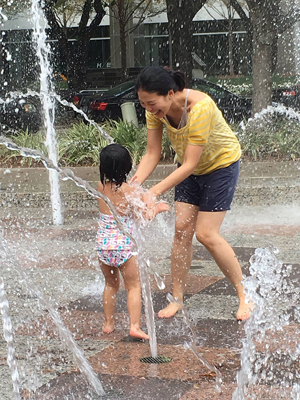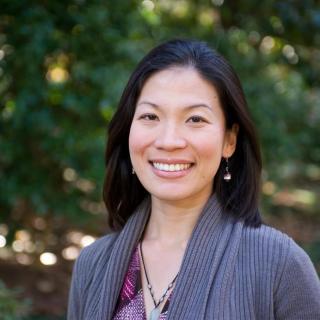
My 5-year-old insists she’d rather have a puppy than a sibling, but I wonder if someday, she’ll change her mind.
My daughter was a miracle, spontaneously conceived after a fertility doctor recommended in vitro fertilization (IVF). A similar miracle is less likely now that I’m 40, no longer trying to conceive with a partner and on the accelerated path to menopause — as I discovered at 34, while consulting the fertility doctor a year after a 14-week pregnancy loss. I was lucky; I learned I was pregnant with my daughter within a month of that consultation.
When she was 3, I attempted egg freezing. This method of fertility preservation removes, freezes and stores a woman’s eggs before they’re fertilized. My attempts weren’t fruitful. Egg freezing and its close cousin, IVF, work best when a woman’s ovaries respond to stimulation medications and produce lots of eggs. My ovaries barely responded. So it seems I will likely only give birth to one genetic child — a reality I continue to process.
Reminders of the sibling who might have been always seem to pop up. Take a recent photo day at my daughter’s evening preschool. She and I snacked next to the staging area as family after family brought up multiple children for sibling photos.
While the photographer captured the sweet cuddles and chubby-cheeked grins, I quietly mourned my powerlessness to produce a biological sibling for my daughter. She, however, seems blissfully unfazed by her singleton state. (Referring to a fellow singleton, she once told me: “Timothy doesn’t have brothers or sisters like me. We’re so lucky!” So maybe I am off the hook? At least for now.)
The funny thing is that despite how alone I can feel, my situation is very common. According to the National Center for Health Statistics, more than 3 million women in the U.S. struggle with secondary infertility, or the inability to conceive following the birth of one or more children conceived without medical intervention. Of all infertility cases in the U.S., secondary infertility accounts for half of all infertility cases in the U.S., according to Resolve: The National Infertility Association.
Understanding secondary infertility
The causes for secondary infertility include parental age, uterine scarring after childbirth and high levels of stress hormones, which can affect ovulation in the woman and sperm production in a man. Unsuccessful attempts to conceive may also be related to a different partner, irregular ovulation, fallopian tube disease or endometriosis.
A parent’s emotions are just as far-ranging. Often, parents find themselves hovering between two worlds — the fertile and infertile — and sympathy may be harder to find than if they had experienced infertility from the start. Shock or disbelief of not conceiving again can lead to a delay in seeing a fertility specialist even when one is needed.
“[People] often experience frustration and confusion, because they wonder why conception was relatively straightforward before but not this time,” says Krista Murtfeldt, LICSW, a psychotherapist who practices in Ballard. “This can be accompanied by feelings of guilt, sadness and regret if they waited to try again.”
People just don’t get secondary infertility. They think fertility is constant.
The curious inquiries of well-meaning friends and relatives often compound those negative emotions. “I feel like every family that has anything other than two kids, two years apart should be prepared to get unhelpful comments,” says Elena*, whom I met in a secondary infertility support group. “People just don’t get secondary infertility. They think fertility is constant.”
Elena says she’s often told, “I think your son needs a brother or sister!” or “Don’t wait too long — you want [your kids] to be playmates.” When she does open up about her infertility struggles, Elena says she often gets unrequested advice.
“People often dismiss my problems by saying, ‘You are still young’ and ‘It will come when you least expect it!’” she says. “None of [those] make me feel better.”
Complicating matters further is the feeling that you’re letting your child down by not having another baby. “Parents can worry about one child carrying the responsibility of aging parents, and they can feel like their family is incomplete,” says Michele Pomarico, LICSW, an infertility counselor and psychotherapist in Northgate. “The parent’s sadness can be mirrored by the thoughts of the child’s loss.”
Parents who’ve been there
Katie Ford of Seattle had her 2-year-old daughter through IVF. Now she’s trying to conceive again with embryos frozen from that same IVF cycle. In January, she lost a pregnancy that took four embryo transfers to achieve. She has two embryos left to transfer.
Get out there
Various local organizations are hosting events in honor of National Infertility Awareness Week (April 23–29). These include:
- The ART of Infertility: SEA-ART-HEAL April 1–30. On display during regular gallery hours, Wednesday–Sunday, 11 a.m.–6 p.m. Free at Art/Not Terminal (A/NT) Gallery at Seattle Center
- One More Shot: A movie about redefining family in the age of modern science and technology. April 2, 1:30 p.m. Filmmaker Q&A to follow. SIFF Film Center
- Vegas Baby: A documentary about aspiring parents and the high cost of fertility treatment-s. April 27, 7:30 p.m. AMC Loews Alderwood 16
- Footsteps for Fertility 5K: April 22, 9–11 a.m. $35–$40. Seward Park, Seattle
- Infertility Advocacy Day in Washington, D.C.: Co-hosted by Resolve: The National Infertility Association and the American Society of Reproductive Medicine. May 18. $10 for new attendees
“Some of my closest friends are getting the age gaps [between their kids that] I so desperately wished for,” she says. “It’s hard to think how different everything would be if it was just easy to get pregnant.”
Emily* of Seattle knew she wanted a third child when her second baby was 3 weeks old. She gave birth to her first child at 31, her second at 35 and was nearly 40 when she and her husband turned to a fertility specialist after three pregnancy losses. The news wasn’t good.
Eighty percent of Emily’s eggs were chromosomally abnormal, which her doctor said was typical for a woman of her age. The couple decided to go ahead with IVF. They ended up with six blastocysts (a 5- to 6-day old embryo), with only one viable enough to attempt a pregnancy. The transfer of that embryo into Emily’s uterus didn’t take.
“My husband and I asked ourselves, ‘Should we give up?’ But our family was just not complete,” says Emily. So, they did another IVF cycle. The lone genetically normal embryo successfully implanted, and Emily became pregnant. She recently gave birth to her third child.
Finding your village
In the Seattle area, there are several options to find support. Emily regularly attended a yoga class in the U District, hosted by instructor Lynn Jensen, who often works with women trying to conceive. “That really gave me a place to go, to do something just for myself,” Emily says of the class. “It was an anchor for me emotionally.”
Many also find solace by joining infertility support groups. As the host of a monthly Resolve group that meets in Greenwood, I often see palpable relief on the faces of first-time visitors. They realize they’re part of an active community.
“The support group in Greenwood is a sanctuary,” says Grace Uomoto, the mother of a 4-year-old boy and a fertility educator trying to conceive her second child. “It’s made such a difference for me to be able to get hugs and meet others who understand what this is like.”
Counseling can also help. In her practice, Murtfeldt encourages the use of coping tools such as mindfulness exercises and breathing techniques to help her clients decrease anxiety and, she says, regain power and control in their lives.
As for me, I still remember the day that I decided to stop fertility treatment. I was seeing a fertility doctor in Arizona and after an ultrasound, headed out for a quick hike with a friend. I was on Camelback Mountain in Phoenix when my nurse called with disappointing news: My final attempt at an egg retrieval wasn’t going to be possible.
“Do you want to turn around and go home?” my friend asked. “No,” I said, “I need to accomplish something while I’m out here. Let’s get to the top.”
At the summit, I took a look around and then had a good cry. I knew it was over. The universe just wasn’t opening this door — or at least not this way — for me. So, I focused on other ways to be a parent.
Later that year, I completed foster parent training and explored adoption and embryo donation. I am also learning to embrace life with an only child. There are many ways to build a family, and that knowledge — hard learned though it is — gives me peace.
*Name has been changed for privacy











